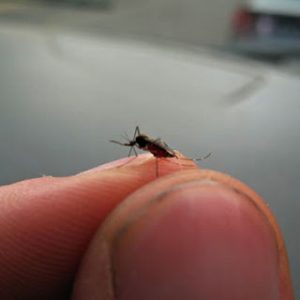
Mosquitoes can carry disease and are very annoying.
Is your cockapoo allergic to insect bites?
During different months of the year, especially the wet months, there are a lot of flying, biting, and generally annoying insects around that can bother you and your cockapoo. We all know about fleas, and that they come out more in the spring and summer, when it is warmer. We spend lots of our effort, time, and money trying to prevent our dogs from getting fleas, but there are not as many remedies for the prevention of mosquito, black fly, and other flying insect bites. When one considers all the diseases and irritation flying insects bring, this may seem a bit of a surprise.
Cockapoos have sensitive skin, and are prone to allergies, as well. If your cockapoo is one of the many that have an allergic reaction to bites, you will by now have become very worried about what you should do to stop your pup from being bitten by insects, and how to help them when you just couldn’t avoid it happening. In this article we’re going to answer some of those concerns and questions.
First and foremost, if you notice skin rash and/or inflammation on your cockapoo, you will want to take your pooch to the vet as soon as you can. There she can be tested for allergies and treated if need be. Your pet’s veterinarian can give you an idea of the best things to use for your particular dog when they have an allergic reaction to insect bites. However, if you already know what insects your pup is allergic to, there are a few things you can do to soothe them.
Benadryl or the generic equivalent, called diphenhydramine, is a human medication that is safe for dogs in the right dosages. It is used for allergies and can ease the itchiness and swelling associated with an allergic reaction. Dogs can have up to 1 milligram per pound. Our cockapoo, for instance, weighs a little under 30 lbs and would typically get around 25 mg, or one standard pill. This dosage technique is considered safe for a small dog, but we must warn you that you should always consult a veterinarian before giving any new medication for the first time, no matter how safe you may think it is!
On the site of the bite or rash, you can make a paste of baking soda and water and apply it to the stings on your cockapoo. This will ease the inflammation and help the swelling go down. You can also put an ice pack on the site to reduce swelling, although we can’t guarantee that your cockapoo will sit still long enough for this to help.
You can bathe your dog in either a mild epsom salt bath or with a skin soothing shampoo such as oatmeal or those for sensitive skin. Remember though, that dogs have sensitive skin and should only have shampoo formulated for canines and also should not be bathed daily as it will dry out their skin.
To prevent bites from insects other than fleas, there are a few things pet owners can do. There is one product on the market that is applied topically once a month, for preventing flea, tick, and mosquito bites. This is K-9 Advantix and can be purchased from your vet or online. In some cases you may find this in PetSmart also, due to them having a vet clinic on site. As far as this type of mosquito repellent goes, so far this is the only one we have found that you can purchase for a monthly dose.
In regards to insect-repelling sprays, the important thing to remember is that you cannot use human insect repellent containing DEET on your dog. Your cockapoo can potentially have a toxic reaction to DEET, so it is a bad idea to use a product with this ingredient. There are several pet bug sprays on the market, and Skin-So-Soft from Avon has been suggested by some owners, but research has shown that it only works effectively for around ten minutes. Some suggested natural oils that may work well for preventing bites from insects are tea tree oil, lemongrass oil, and lemon eucalyptus oil. Citronella is also widely used to good effect also, according to testimonials found online. You can dilute natural oils and put them directly on your cockapoos fur, add a bit to a bath rinse (keeping out of eyes, ears, nose, and mouth), or simply purchase a canine insect repellent spray, preferably with natural ingredients. Alternatively, you may try to use a bug repellent collar that they can wear outside.
Lastly, if the issue is mostly in your yard, you can spray your yard with pet friendly bug repellent, or have this done professionally. There are a lot of products out there, and some are safer than others, so always be sure to do your research before using any product your cockapoo will be around. Ask your vet for suggestions if you are unsure of how to approach any prevention or treatment of bites on your dog.
